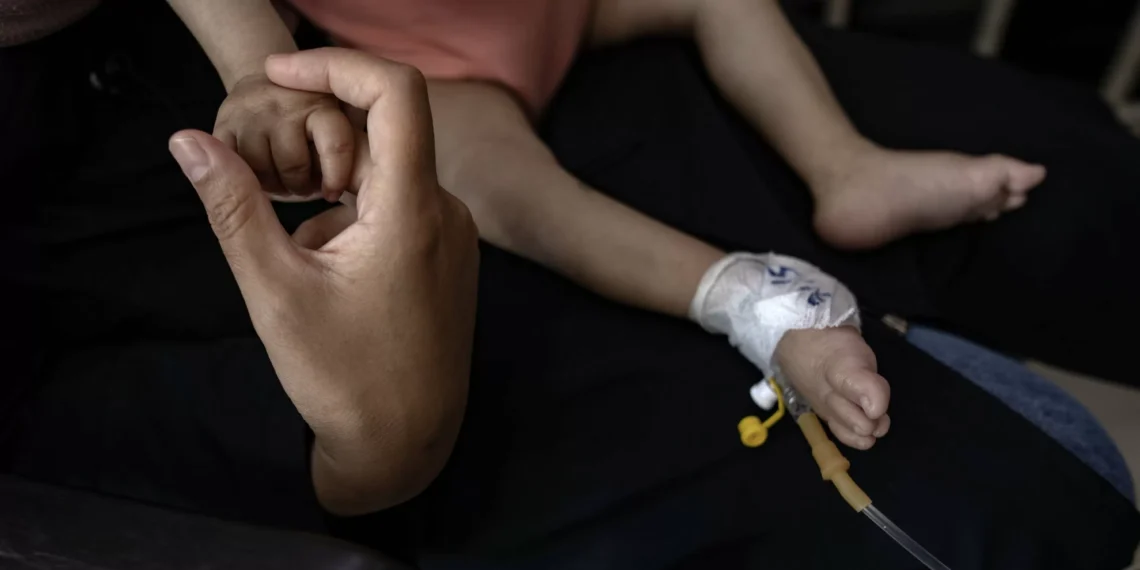Gazan Children: The Innocent Victims of Hunger and Malnutrition
The Palestinian territory of Gaza has been in a state of crisis for many years, with its people facing numerous challenges on a daily basis. However, one of the most heartbreaking and pressing issues is the alarming rate of malnutrition among children. According to recent reports, nearly 10,000 children in Gaza are suffering from different levels of malnutrition, with their health and well-being at risk.
Amira al-Taweel, a concerned mother and resident of Gaza, has been tirelessly working to bring attention to this issue. She has been visiting pharmacies and hospitals, gathering data and speaking to families who are struggling to provide for their children. Her findings are shocking and paint a grim picture of the situation in Gaza.
The root cause of this crisis can be traced back to the ongoing conflict in the region. The blockade imposed on Gaza has severely limited the movement of goods and people, making it difficult for families to access basic necessities such as food and medicine. The economic situation in Gaza is dire, with high unemployment rates and poverty levels. This has left many families unable to afford nutritious food for their children, leading to malnutrition and its devastating consequences.
Malnutrition is not just about being hungry; it is a serious medical condition that can have long-term effects on a child’s physical and mental development. It weakens the immune system, making children more susceptible to diseases and infections. It also affects their cognitive abilities, hindering their learning and academic performance. Malnourished children are more likely to drop out of school and face a lifetime of poverty and health issues.
The situation is particularly dire for infants and young children, who are the most vulnerable to malnutrition. Breast milk is the best source of nutrition for babies, but many mothers in Gaza are unable to breastfeed due to their own poor health or lack of access to proper nutrition. This puts their babies at an even higher risk of malnutrition.
The consequences of malnutrition are not limited to physical health. It also takes a toll on a child’s mental well-being. Malnourished children are often lethargic, irritable, and have difficulty concentrating. They are unable to play and enjoy their childhood like other children, which can have a lasting impact on their emotional and psychological development.
The situation in Gaza is dire, but there is hope. Organizations like the United Nations Children’s Fund (UNICEF) and the World Food Programme (WFP) are working tirelessly to provide aid and support to the people of Gaza. They are providing food assistance, nutritional supplements, and medical care to children in need. However, their efforts are not enough, and more needs to be done to address this crisis.
It is not just the responsibility of international organizations to help the children of Gaza. We, as a global community, must come together and take action to alleviate their suffering. We must urge our governments to put pressure on all parties involved in the conflict to lift the blockade and allow for the free movement of goods and people. We must also support local initiatives and organizations that are working to provide aid and support to the people of Gaza.
Amira al-Taweel’s efforts to bring attention to this issue are commendable, and we must all follow her lead. We must raise awareness about the plight of these innocent children and urge others to take action. Every child deserves a chance at a healthy and happy life, and it is our duty to ensure that the children of Gaza are not left behind.
In conclusion, the situation in Gaza is dire, and the children are bearing the brunt of it. The high rate of malnutrition among children is a crisis that needs immediate attention and action. We must all come together and do our part to help these innocent children. Let us not turn a blind eye to their suffering and instead, work towards a brighter and healthier future for the children of Gaza.







